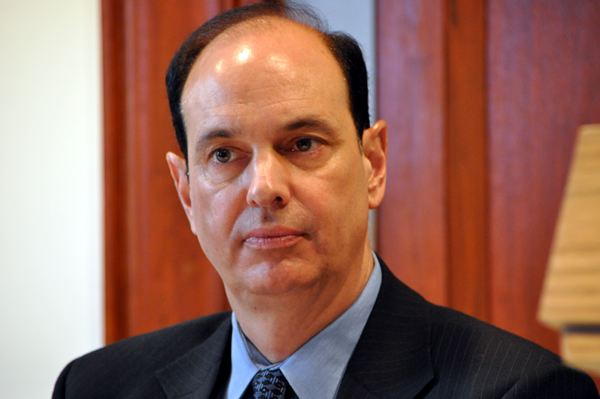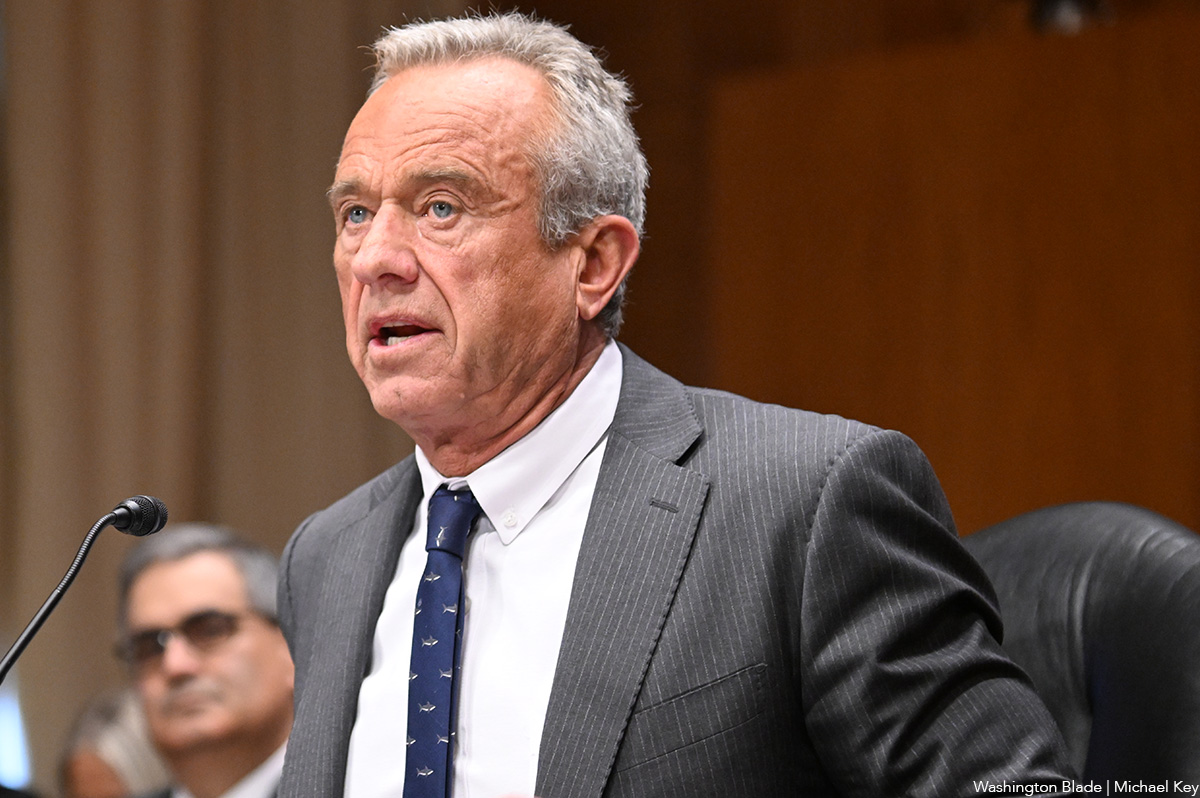National
‘Fiscal cliff’ brings fears of devastating AIDS cuts
More than 12,000 HIV patients could lose access to care next year


AIDS Institute Deputy Executive Director Carl Schmid estimated that up to 12,000 people in ADAP could lose access to care. (Blade file photo by Michael Key)
Pending across-the-board cuts to federal programs have advocates concerned that up to 12,200 people living with HIV/AIDS in the United States could lose access to drugs and programs unless Congress takes action.
The anticipated cuts, set to take effect on Jan. 2, are the result of the Budget Control Act, legislation President Obama signed last year as part of a compromise to raise the limit on the nation’s debt ceiling. It would reduce continued funding for the U.S. government in 2013 and beyond by cutting an estimated 8.2 percent in the first year from discretionary federal programs — including HIV/AIDS programs.
Carl Schmid, deputy executive director of the AIDS Institute, said unless Congress acts to institute an alternative budget, the level of funding provided would be troublesome because “people wouldn’t be able to get their drugs.”
“The sequestration wasn’t ever to occur and within three months from now, it’s going to take place unless Congress acts,” Schmid said. “It would be devastating to our programs.”
Kimberly Crump, policy officer at HIV Medicine Association, said problems are already emerging because care providers aren’t sure what level of funding will ultimately be provided.
“It really hinders them in hiring staff and making decisions around personnel, around controlling costs of labs and accepting new patients, the hours that they can be open,” Crump said. “It’s going to really start to impact availability of services.”
Estimates for what these cuts would mean for people living with HIV/AIDS have varied widely. In a letter dated Sept. 19 to Congress, the AIDS Institute says the reductions to ADAP funding could mean wait lists for drugs would once again be extended and around 9,400 patients would lose access to medication.
“This would automatically create wait lists again, and extremely long ones,” Schmid told the Blade. “But it could be even more than that, we’re doing some further analysis, so some people are saying it’s like 10,000 to 12,000 people removed from the ADAP program if this sequestration goes through.”
The number is an estimate from the Department of Health & Human Services. In a June 29 letter to Congress, Ellen Murray, HHS assistant secretary for financial resources, writes that “approximately 12,150 fewer patients” would receive benefits from the AIDS Drug Assistance Program.
A July 25 report from the Senate Health, Education, Labor & Pensions Committee similarly estimates that 12,219 people in the United States receiving drugs from ADAP would lose access to medicine. The report details how many individuals would lose access for each jurisdiction in the United States. For example, the committee estimates 199 fewer people in D.C. would have access to drugs.
In the letter to Congress, the AIDS Institute spells out the reductions to four federal HIV/AIDS programs that would result from sequestration, which amounts to a total reduction of $538 million based on calculations from fiscal year 2012 levels:
• funding for HIV prevention at the Centers for Disease Control would be cut by $64 million;
• the Ryan White HIV/AIDS Program, which provides care to low income people with the disease, would be cut by $196 million, including $77 million in cuts from the AIDS Drug Assistance Program;
• AIDS research at the National Institutes of Health would be cut by $251 million;
• and the Housing Opportunities for People with AIDS, or HOPWA, program would be cut by $27 million.
One consolation is that funds for Medicare and Medicaid would largely be immune from cuts. Medicare would only be reduced by 2 percent — and those cuts wouldn’t come from programs for patients, but providers. Medicaid, under which 50 percent of people living with HIV/AIDS receive care, won’t see any cuts.
The Washington Blade reported in August 2011 at the time President Obama signed the Budget Control Act that the legislation could impact HIV/AIDS programs, and again reported on the issue when the congressional supercommittee established by the legislation failed to provide an alternative to across the board cuts, but cost estimates for reductions weren’t previously known.
But the cuts wouldn’t only affect domestic programs aimed at providing care to people with HIV, but global programs as well, including the President’s Emergency Plan for AIDS Relief, or PEPFAR, and U.S. contributions to the Global Fund to Fight AIDS, Tuberculosis and Malaria.
Chris Collins, director of policy for amfAR, said the sequestration — commonly referred to as the “fiscal cliff” — would have a “devastating impact” on programs aimed at confronting HIV/AIDS overseas.
“It would undercut multiple aspects of the global AIDS response from treating people, which we know has a potential for saving lives, but also to preventing infection, as well as programs to help kids who are vulnerable,” Collins said. “Sequestration sets us up for seriously backtracking in response to global AIDS just at the time when we have the ability to really accelerate progress.”
In a brief published Sept. 25, amfAR provides details on the problems that reductions to global AIDS initiatives would cause. As a result of projected decreases to U.S. government bilateral support, HIV/AIDS treatments for 276,500 people wouldn’t be available, potentially leading to 63,000 more AIDS-related deaths and 124,000 more children becoming orphans. The decrease in U.S. contributions to the Global Fund would result in an additional 100,000 people not being treated for HIV/AIDS.
In addition to HIV/AIDS programs, federal initiatives that more generally serve the LGBT community would also face cuts under the sequester. The U.S. Equal Employment Opportunity Commission, which earlier this year interpreted federal law to allow it to protect transgender workers from discrimination, would face cuts as would the Justice Department’s community relations service to fight hate crimes.
Laurie Young, the National Gay & Lesbian Task Force’s director of aging and economic security, said the sequester could have an impact on local LGBT community centers that rely on funds from the federal government.
“Any programs … that are funded out of the Older Americans Act — community health programs, community health centers — any of the programs that receive any kind of federal support could be affected by it,” Young said.
Young said the cuts could also affect U.S. governmental efforts in research, including data collection efforts for LGBT people on health surveys, which the Department of Health & Human Services began to implement last year upon requests from LGBT advocates.
HIV/AIDS advocates expressed dismay that the pending defense cuts under the sequester — which would reduce the Pentagon’s budget by an estimated $54.7 billion in 2013 — have received attention in the media, but other programs haven’t received significant attention.
Crump said big ticket items like defense and Medicare have greater “political clout” behind them, which makes other programs such as HIV/AIDS more vulnerable to cuts.
“It makes the non-defense discretionary budget more vulnerable to cuts when these other big ticket items have their champions talking about fencing off or protecting them,” Crump said. “That means we’re going to have to cut more steeply into these other annually funded programs.”
Government agencies that operate programs for people with HIV/AIDS referred the Washington Blade to the White House Office of Budget & Management, which issued a report on Sept. 14 detailing the extent of cuts to government programs.
“As the administration has made clear, no amount of planning can mitigate the effect of these cuts,” the report states. “Sequestration is a blunt and indiscriminate instrument. It is not the responsible way for our nation to achieve deficit reduction.”
Amid this fear, observers were generally optimistic that Congress would institute an alternative to the Budget Control Act to avoid the cuts to HIV/AIDS and other programs.
A Senate Democratic aide, who spoke on condition of anonymity, said an agreement to avoid the sequester would likely be reached after campaign season has concluded.
“As much as we like to piss on each other’s boots and do nothing, when there’s a gun to our head, we know it’s time to do something,” the aide said.
The aide predicted a proposal similar to previously proposed bipartisan debt reduction plans — those from the Simpson-Bowles Commission, the Domenici-Rivlin Task Force or the “Gang of Six” — would be enacted.
But even if an agreement is reached, concerns persist that Congress could enact a plan that would cut into HIV/AIDS funds even more so than the Budget Control Act — especially because another agreement on the debt ceiling must be reached in February when the limit will likely be reached.
Schmid said an alternative plan that Congress might come up with could reach into currently protected programs of Medicare and Medicaid to pay for budget reduction.
“We still have to come up with these cuts, and so they are looking at different ways,” Schmid said. “But Medicare and Medicaid will be back on the table again, and we are concerned about that as well.”
Young predicted that any plan Congress would enact for deficit reduction would cut funding for government programs, but it remains to be seen where those cuts would fall.
“There’s going to be some pain somewhere because the whole reason that the sequestration was enacted and passed was because of the rampant fears about the outrageous federal deficit,” Young said. “Now I could get on my soap box with you, but the reason that the deficit is the way it is today is because we’ve had 10 or 12 years of tax cuts, and in order to pay our bills we have to have money coming in.”
And Crump said if the election results in wins for Republicans, they may feel emboldened to pass a plan similar to what House Budget Committee Chair and Republican vice presidential nominee Paul Ryan has proposed, which she said would “cut even more deeply” than sequestration.
“There’s a looming series of threats to the whole health care environment that could very much impact the hope that the Affordable Care Act held for improving HIV care and access to care for people with HIV,” Crump said.
New York
Men convicted of murdering two men in NYC gay bar drugging scheme sentenced
One of the victims, John Umberger, was D.C. political consultant

A New York judge on Wednesday sentenced three men convicted of killing a D.C. political consultant and another man who they targeted at gay bars in Manhattan.
NBC New York notes a jury in February convicted Jayqwan Hamilton, Jacob Barroso, and Robert DeMaio of murder, robbery, and conspiracy in relation to druggings and robberies that targeted gay bars in Manhattan from March 2021 to June 2022.
John Umberger, a 33-year-old political consultant from D.C., and Julio Ramirez, a 25-year-old social worker, died. Prosecutors said Hamilton, Barroso, and DeMaio targeted three other men at gay bars.
The jury convicted Hamilton and DeMaio of murdering Umberger. State Supreme Court Judge Felicia Mennin sentenced Hamilton and DeMaio to 40 years to life in prison.
Barroso, who was convicted of killing Ramirez, received a 20 years to life sentence.
National
Medical groups file lawsuit over Trump deletion of health information
Crucial datasets included LGBTQ, HIV resources

Nine private medical and public health advocacy organizations, including two from D.C., filed a lawsuit on May 20 in federal court in Seattle challenging what it calls the U.S. Department of Health and Human Services’s illegal deletion of dozens or more of its webpages containing health related information, including HIV information.
The lawsuit, filed in the United States District Court for the Western District of Washington, names as defendants Robert F. Kennedy Jr., secretary of the Department of Health and Human Services (HHS) and HHS itself, and several agencies operating under HHS and its directors, including the Centers for Disease Control and Prevention, the National Institutes of Health, and the Food and Drug Administration.
“This action challenges the widespread deletion of public health resources from federal agencies,” the lawsuit states. “Dozens (if not more) of taxpayer-funded webpages, databases, and other crucial resources have vanished since January 20, 2025, leaving doctors, nurses, researchers, and the public scrambling for information,” it says.
“These actions have undermined the longstanding, congressionally mandated regime; irreparably harmed Plaintiffs and others who rely on these federal resources; and put the nation’s public health infrastructure in unnecessary jeopardy,” the lawsuit continues.
It adds, “The removal of public health resources was apparently prompted by two recent executive orders – one focused on ‘gender ideology’ and the other targeting diversity, equity, and inclusion (‘DEI’) programs. Defendants implemented these executive orders in a haphazard manner that resulted in the deletion (inadvertent or otherwise) of health-related websites and databases, including information related to pregnancy risks, public health datasets, information about opioid-use disorder, and many other valuable resources.”
The lawsuit does not mention that it was President Donald Trump who issued the two executive orders in question.
A White House spokesperson couldn’t immediately be reached for comment on the lawsuit.
While not mentioning Trump by name, the lawsuit names as defendants in addition to HHS Secretary Robert Kennedy Jr., Matthew Buzzelli, acting director of the Centers for Disease Control and Prevention; Jay Bhattacharya, director of the National Institutes of Health; Martin Makary, commissioner of the Food and Drug Administration; Thomas Engels, administrator of the Health Resources and Services Administration; and Charles Ezell, acting director of the Office of Personnel Management.
The 44-page lawsuit complaint includes an addendum with a chart showing the titles or descriptions of 49 “affected resource” website pages that it says were deleted because of the executive orders. The chart shows that just four of the sites were restored after initially being deleted.
Of the 49 sites, 15 addressed LGBTQ-related health issues and six others addressed HIV issues, according to the chart.
“The unannounced and unprecedented deletion of these federal webpages and datasets came as a shock to the medical and scientific communities, which had come to rely on them to monitor and respond to disease outbreaks, assist physicians and other clinicians in daily care, and inform the public about a wide range of healthcare issues,” the lawsuit states.
“Health professionals, nonprofit organizations, and state and local authorities used the websites and datasets daily in care for their patients, to provide resources to their communities, and promote public health,” it says.
Jose Zuniga, president and CEO of the International Association of Providers of AIDS Care (IAPAC), one of the organizations that signed on as a plaintiff in the lawsuit, said in a statement that the deleted information from the HHS websites “includes essential information about LGBTQ+ health, gender and reproductive rights, clinical trial data, Mpox and other vaccine guidance and HIV prevention resources.”
Zuniga added, “IAPAC champions evidence-based, data-informed HIV responses and we reject ideologically driven efforts that undermine public health and erase marginalized communities.”
Lisa Amore, a spokesperson for Whitman-Walker Health, D.C.’s largest LGBTQ supportive health services provider, also expressed concern about the potential impact of the HHS website deletions.
“As the region’s leader in HIV care and prevention, Whitman-Walker Health relies on scientific data to help us drive our resources and measure our successes,” Amore said in response to a request for comment from the Washington Blade.
“The District of Columbia has made great strides in the fight against HIV,” Amore said. “But the removal of public facing information from the HHS website makes our collective work much harder and will set HIV care and prevention backward,” she said.
The lawsuit calls on the court to issue a declaratory judgement that the “deletion of public health webpages and resources is unlawful and invalid” and to issue a preliminary or permanent injunction ordering government officials named as defendants in the lawsuit “to restore the public health webpages and resources that have been deleted and to maintain their web domains in accordance with their statutory duties.”
It also calls on the court to require defendant government officials to “file a status report with the Court within twenty-four hours of entry of a preliminary injunction, and at regular intervals, thereafter, confirming compliance with these orders.”
The health organizations that joined the lawsuit as plaintiffs include the Washington State Medical Association, Washington State Nurses Association, Washington Chapter of the American Academy of Pediatrics, Academy Health, Association of Nurses in AIDS Care, Fast-Track Cities Institute, International Association of Providers of AIDS Care, National LGBT Cancer Network, and Vermont Medical Society.
The Fast-Track Cities Institute and International Association of Providers of AIDS Care are based in D.C.
U.S. Federal Courts
Federal judge scraps trans-inclusive workplace discrimination protections
Ruling appears to contradict US Supreme Court precedent

Judge Matthew Kacsmaryk of the U.S. District Court for the Northern District of Texas has struck down guidelines by the U.S. Equal Employment Opportunity Commission designed to protect against workplace harassment based on gender identity and sexual orientation.
The EEOC in April 2024 updated its guidelines to comply with the U.S. Supreme Court’s ruling in Bostock v. Clayton County (2020), which determined that discrimination against transgender people constituted sex-based discrimination as proscribed under Title VII of the Civil Rights Act of 1964.
To ensure compliance with the law, the agency recommended that employers honor their employees’ preferred pronouns while granting them access to bathrooms and allowing them to wear dress code-compliant clothing that aligns with their gender identities.
While the the guidelines are not legally binding, Kacsmaryk ruled that their issuance created “mandatory standards” exceeding the EEOC’s statutory authority that were “inconsistent with the text, history, and tradition of Title VII and recent Supreme Court precedent.”
“Title VII does not require employers or courts to blind themselves to the biological differences between men and women,” he wrote in the opinion.
The case, which was brought by the conservative think tank behind Project 2025, the Heritage Foundation, presents the greatest setback for LGBTQ inclusive workplace protections since President Donald Trump’s issuance of an executive order on the first day of his second term directing U.S. federal agencies to recognize only two genders as determined by birth sex.
Last month, top Democrats from both chambers of Congress reintroduced the Equality Act, which would codify LGBTQ-inclusive protections against discrimination into federal law, covering employment as well as areas like housing and jury service.

















